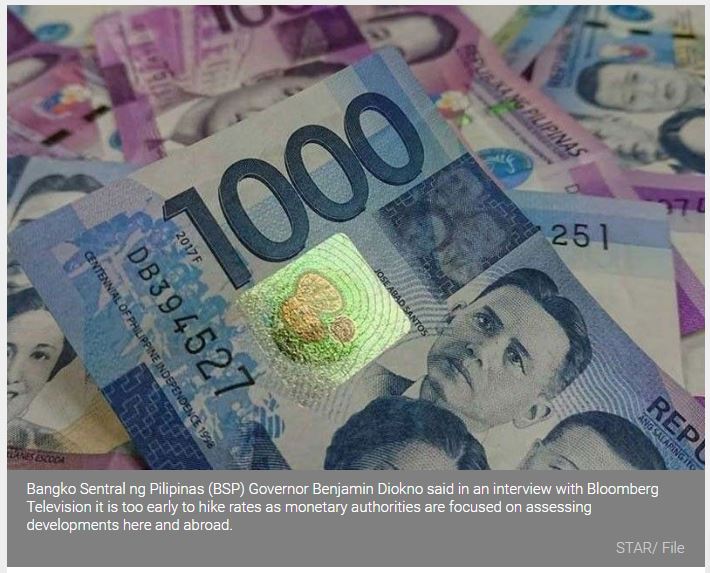Philippines: ‘Rate hike too early as recovery hangs’
MANILA, Philippines — The head of the country’s central bank said an accommodative monetary stance remains in place as it is too early to raise interest rates.
Bangko Sentral ng Pilipinas (BSP) Governor Benjamin Diokno said in an interview with Bloomberg Television it is too early to hike rates as monetary authorities are focused on assessing developments here and abroad.
“Right now we don’t see any need to increase interest rates at this point,” he said.
Economic managers, through the Development Budget Coordination Committee, are looking at a gross domestic product (GDP) rebound to a growth of 6.5 to 7.5 percent this year and eight to 10 percent next year after a record contraction of 9.5 percent in 2020 due to the impact of the COVID-19 pandemic.
“Right now we are looking at 2021 as a recovery year and at 2022, that is the year when we will be back to where we were before the crisis,” Diokno said.
The BSP did the heavy lifting last year as COVID-19 measures unleashed P2 trillion into the financial system to cushion the impact of the global health pandemic on the economy.
It emerged as one of the most aggressive central banks in the world after it delivered a 200-basis-point interest rate cut, bringing the benchmark rate to an all-time low of two percent. It also lowered the reserve requirement ratios for banks to free up more cash into the economy.
On concerns of a slower-than-expected recovery and to allow the economy to digest previous aggressive easing measures, the central bank’s Monetary Board has kept interest rates on hold in the last two rate setting meetings in December and February.
“We think the current policy setting is appropriate for this kind of outlook. So we intend to maybe keep an accommodative monetary policy with the existing policy rates at historic low of two percent to provide support to the economy,” Diokno said.
The BSP chief sees consumption growing by five percent this year after slumping last year.
“I think there will be an upsurge in consumption this year. We had a significant fall in consumption last year because of the pandemic and severe lockdown. But we expect consumption to maybe grow five percent this year,” Diokno said.
Likewise, Diokno said the country’s unemployment rate would continue to improve after hitting an all-time high of 17.7 percent in April last year as the economy continues to reopen.
“The plan is to open up the whole economy to go to the lowest quarantine level nationwide. So that should there be a surge in certain areas, there will just be a village-level or town-level lockdown, not region-wide, not province-wide, not nationwide lockdown,” Diokno said.
Economic managers want to bring down the unemployment level back to five percent as the government is optimistic of vaccinating around 70 million of Filipino adults within the year.
In terms of inflation, Diokno said prices are seen easing in the second half after remaining elevated in the first half due to supply-side factors such as the rise in global oil prices, as well as the increase in the prices of key commodities such as meat and vegetables due to the African Swine Fever (ASF) outbreak and weather-related disturbances.
Inflation accelerated to a two-year high of 4.2 percent in January, exceeding the BSP’s two to four percent target range.
“So we expect inflation to be elevated during the first half of this year, but it will taper off in the second half. And we’re optimistic that it will still be within our target range,” the BSP chief added.
Based on its latest assessment, the central bank’s Monetary Board now expects inflation to average four percent instead of 3.2 percent this year and 2.7 percent instead of 2.9 percent next year.
Source: https://www.philstar.com/business/2021/02/18/2078480/rate-hike-too-early-recovery-hangs


 English
English




